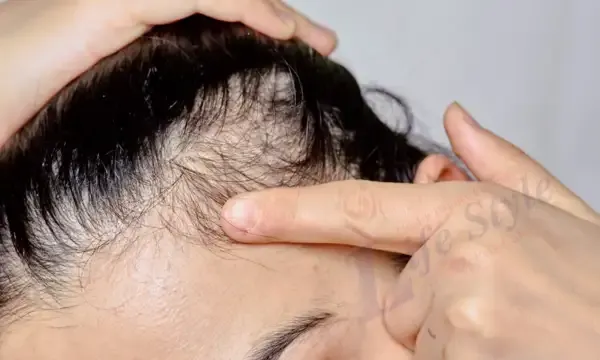Thinning hair
Thinning Hair refers to slight to moderate hair loss, but it does not necessarily lead to baldness, however, it causes patches of thinning hair to appear on your head. Thinning hair occurs gradually, so don't worry because you have enough time to identify the causes and find out the best suitable treatments.
Causes of thinning hair
Lifestyle habits
Excessive use of remedies for your hair includes hair dyes and others.
Use harsh hair products such as hair sprays and gels.
Tying your hair very tightly is like tying it in the form of a ponytail during exercise.
lack of iron, and other minerals.
Stress and tension lead to a rise in hormones such as cortisol which prevents the growth of new hair from the hair follicles.
Genetic and medical causes
Procreation.
Stop taking birth control pills.
Hormonal changes.
autoimmune illness treatment.
immunocompromised infection.
having an infection or skin condition.
Less common causes
Pull out the hair.
Eating disorders.
Elevated body temperature.
Thinning hair treatment
Scalp massage
Of course, this method is the cheapest way to get thick hair, it is inexpensive and has no side effects. When you wash your hair, gently press your fingertips around your scalp to stimulate blood flow.
Essential oils
They are liquids derived from some plants and are used in aromatherapy and other types of alternative medicine. There are some essential oils that you can use to treat Thinning hair, including:
Lavender oil.
Rosemary oil.
Thyme oil.
Peppermint oil.
If you decide to use these oils, you should put a small amount of them on your arm and wait for 24 hours to make sure that there is no skin reaction such as redness, rash, or others.
Thinning hair shampoo
This shampoo provides a more intense look to your hair as it contains vitamins and amino acids that make your hair healthier. You can ask your doctor to prescribe the right shampoo for your hair.
Multivitamins
Your hair growth may fail in cases of malnutrition or certain eating disorders. Your doctor can detect your lack of nutrients through blood analysis, and therefore may prescribe you multivitamins such as iron, folic acid, and zinc.
Folic acid supplements
Folic acid is a type of B vitamin that is important for the generation of new cells. It is believed that folic acid may help the growth of new hair follicles in bald areas.
Biotin
It is found naturally in foods such as nuts, lentils, and liver. You may not be deficient in biotin if you eat a balanced diet. You should not take biotin if you are taking vitamin B-5 as this reduces the effectiveness of one of them if taken together.
Omega-3 and omega-6
They are called essential fatty acids because they are not produced by the human body. Omega-3 helps your body fight inflammation and is the reason behind most cases of even thinning hair. Omega-6 is considered an important component for the health of the skin in general, including the scalp.
Vegetable oils are the main source of omega-6, while omega-3 is found in fish. If you do not eat these foods normally, you should talk to your doctor to prescribe alternative supplements.
Treatment of thinning hair with medications
Minoxidil
This medicine is available without a prescription, you can apply it to the scalp twice a day and you may notice gradually thickening hair in bald spots. You should use this medicine constantly so that the results last. There are some possible side effects from its use such as scalp irritation and unwanted hair growth on the face and neck.
Spironolactone
It is prescribed to people who have Thinning hair due to androgen production. This drug may help women treat thinning hair and hair loss related to hormonal fluctuations. You should take a blood analysis before using this medication.
Finasteride
This drug is prescribed only for men, it is a tablet that is taken daily for the treatment of hair loss. Women should avoid this drug due to serious side effects, especially in the case of pregnancy or lactation.
Cortisone
This treatment is used for conditions associated with the presence of latent inflammation, as some inflammatory conditions can cause a range of symptoms, including thinning hair.
Thinning hair treatment with non-surgical procedures
PRP hair plasma injection
Injections of platelet-rich plasma are used, which is separated from the blood drawn from the patient himself, and then injected into the scalp again, as it is rich in specialized proteins that help to increase hair growth.
Plasma injections are applied in several sessions separated by a few months, then the hair may seem thicker and denser, and you may need enhanced treatment after 6 months after the hair growth begins to slow down.
Mesotherapy needles for hair
It is an injection containing a complex of nutrients for the hair, such as vitamins, enzymes, hormones, plant extracts, and also necessary medicines.
They are injected into the patient's scalp with fine needles, to treat hair loss and increase their density. Injections are done through several separate sessions, and you can get the desired result after about 7 sessions.
Low-level laser
Laser treatment at home is aimed at helping to regrow your hair and increase its density, and it can take several months for the results to appear. The biggest disadvantage of this treatment is considered to be its high cost since some laser devices are quite expensive.
Treatment of Thinning hair by natural methods
Some natural recipes are available to treat thinning hair, but you should consult a doctor first before trying any of these recipes, to ensure that you do not experience allergic reactions to them, some of which include the following:
Ginseng is an herb traditionally used to treat hair loss.
Garlic gel due to its antimicrobial and anti-inflammatory properties.
Onion juice may stimulate hair follicles.
Procyanidins, a class of flavonoid antioxidants found in apples, cinnamon, grapes, and caffeine, promote hair growth.

